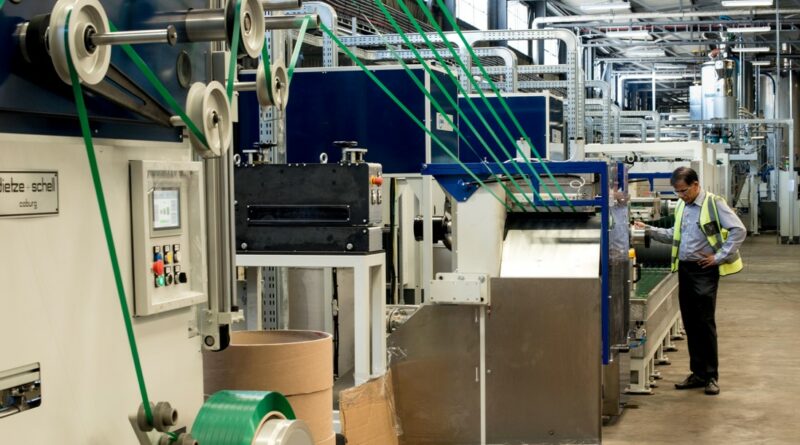Team work in the plastics value chain
New extended producer responsibility (EPR) legislation is a benefit, one of Africa’s largest PET recyclers explains
RTo reduce the amount of packaging waste sent to landfill and to accelerate the circular economy, South Africa has implemented EPR regulations. One of the biggest recyclers of PET bottles on the African continent, Extrupet, has been guided in its journey by long-standing producer responsibility organisation Petco. At the same time – and in a first for South Africa – Extrupet is helping its partner to develop an additional end-use market for recycled PET (rPET) in the manufacture of rPET industrial strapping.
Plastic strapping is used to secure unstable goods during transit. From a circular economy perspective, both PET bottles and PET strapping can be diverted from landfill, and economically recovered and recycled into new products, without compromising the quality of the end product. As a manufacturer of strapping, Extrupet, like other packaging producers, is now obligated to either join an existing producer responsibility organisation (PRO), start a new PRO or run an individual compliance scheme, as part of the National Environmental Management Waste Act (NEMWA) Section 18 mandatory EPR regulations, which came into effect in South Africa in November 2021.
In terms of the regulations, producers must take practical and financial responsibility for the full lifecycle of their products. This means designing packaging with recyclability and circularity in mind and also including more recycled content in their products.
“Many companies are still importing rPET strapping, so closing the loop locally provides another high-value end-use for rPET, aside from bottle-to-bottle recycling, or turning it into polyester staple fibre,” said Extrupet joint managing director Chandru Wadhwani. While clear PET plastic bottles had the highest commercial value for bottle-to-bottle recycling, Wadhwani explained that green and brown PET bottles had limited end-use products associated with them, because they discoloured the recyclate and could not be used for bottle-to-bottle recycling.
“In the past, plastic strapping has provided a viable end-use market for coloured rPET. As producers begin to move away from coloured to clear bottles for maximum recyclability, the clear bottles can now also serve as feedstock for strapping,” he said. “I would like to encourage companies to support homegrown circular initiatives. The more end-use markets we develop for rPET, the more the benefits will be felt along the entire value chain – right down to the waste pickers.”
Petco CEO Cheri Scholtz said the Section 18 regulations essentially compelled all organisations and companies involved along the plastics value chain to work as a team to ensure that less waste ended up in landfill. In terms of the regulations, every brand owner, converter, or retailer that places more than 10 t/a of identified plastic packaging onto the consumer market is deemed a producer and is required to pay an EPR fee per tonne.
The knock-on effect of mandatory EPR is set to be heightened investment in infrastructure to support the sustainability of the recycling sector – from the waste pickers who collect recyclables, to the buy-back centres who purchase and re-sell the materials, and the large-scale recyclers who turn these into recyclate that can be made into new products.
“Without EPR, we wouldn’t be able to scale collection and recycling rates sufficiently to make a meaningful difference to the amount of packaging waste that ends up in the environment each year,” she said.
Wadhwani said there was a delicate balance between collection, recycling capacity and demand for rPET in the recycling value chain: “As the only Section 18-registered strapping producer in South Africa, our strapping helps to maintain that balance by providing another end-use market for rPET. Growth in rPET production and consumption is ultimately key to ensuring the sustainability of both the PET and recycling industry,” he said.
Strapping falls into the PET flexibles category where legislated targets state that 50% of the product must comprise rPET, 10% must be collected, and 9% recycled. Petco and Extrupet will be working together to achieve these mandated targets.
Expanding recycling capabilities
South Africa’s PET recycling industry is performing well. In 2019, a total of 2.2 billion bottles were collected which amounted to a 62% recycling rate. Recycling company Extrupet announced in April a further expansion of their food-grade plastics recycling operations. We spoke to Chandru Wadhwani, Extrupet’s Joint Managing Director.
PETplanet: Extrupet recently announced an expansion of the food-grade PET recycling operations in South Africa. Can you please explain the background and the capacities you are aiming to achieve?
Wadhwani: We will double our food-grade operations by adding a second food-grade rPET facility, which will increase our recycling capacity by an additional 33,000 t/a. Currently Extrupet has one Vacurema and two Starlinger lines based out of Johannesburg.
PETplanet: Can you envisage transferring your expertise to other African countries and expanding further outside South Africa?
Wadhwani: We are currently in dialogue to make investments in West and East Africa, namely Nigeria, Ghana and Kenya, Tanzania and Uganda.
PETplanet: What directives or legally prescribed recycling quotas must be complied with in S. Africa?
Wadhwani: November of 2021 saw the beginning of this kind of legislation. Extended producer responsibility (EPR) was gazetted across three main sectors, namely, 1) electrical and electronic equipment, 2) the lighting sector, and 3) paper, packaging and single use products. For PET beverage packaging specifically, there would need to be a 10% inclusion rate of rPET in year 1, 12.5% in year 2, 13% in year 3, 15% in year 4 and 20% in year 5 in order for the bottle to comply.
PETplanet: To meet these quotas, how could a reliable and predictable availability of in coming material be further improved?
Wadhwani: In South Africa, most of the bottle raw material originates from landfill. Separation at source projects spearheaded by government would be a great starting point and certainly help the quality of incoming raw material. There would however be a cost associated with this, and to get the process subsidised as in Europe would be the ultimate goal.
PETplanet: What is the quality of the material you receive?
Wadhwani: Most of the raw material collected originates through an informal collection system, and once delivered to our factory the yield loss is as much as 35% from beginning to end.
PETplanet: Which markets are you supplying with your food-grade rPET?
Wadhwani: Africa, EU, UK, Australia, and the USA. There are different approval / certification levels needed for each; however our main food approval agencies, BRC, FDA, EFSA, SMETA and ISO cover most of our customer needs.
PETplanet: Recently, the price for vPET was fetching around 1,700€/t, a very high value, but the price for rPET flakes was as high as 1,950€/t and for granules even 2,200€/t or more. Are you concerned about this development?
Wadhwani: Yes, we are very concerned as pricing will have a huge impact on the availability of feedstock. Without which one cannot produce food grade rPET.
PETplanet: Thank you very much, Mr Wadhwani!


